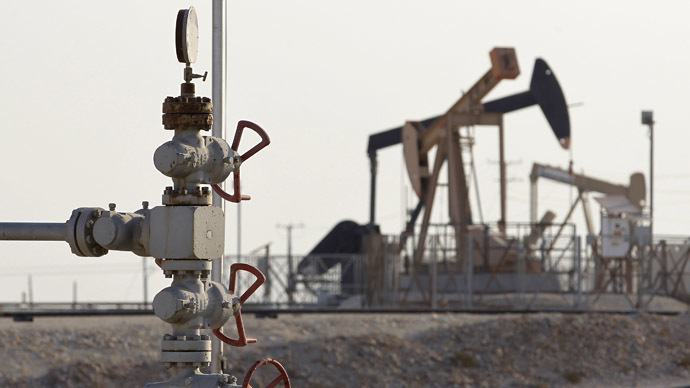‘Oversupply and weakening demand growth behind oil price fall’

The reason for the decline in oil prices is a combination of oversupply on the market and the weakening demand growth, Stuart Elliott, Editor, Europe & Africa Oil News at PLATTS, told RT.
RT: How do you explain the steep decline in oil prices right now?
Stuart Elliott: Two factors are playing an all important part in the fall. The first is that production, oil supply to global markets is at all-time high. We are seeing record production in the United States. They are producing the highest level of crude for three decades - 9 million barrels a day. And we have a recovery in Libyan oil production which was off the market for some time because of the various protests and strike actions by people in Libya. They are back up to a million barrels a day. You have got this oversupply on the market basically. And now this is coupled with very weak demand growth. People thought this time last year that oil demand would continue to grow in countries like China, and Russia, and even in places like India. But we haven’t seen the growth that was expected. So you combine those two factors - oversupply with weakening demand growth - and that is the reason for this big fall in prices.
READ ALSO:Global oil glut sends prices plunging to 5-year low
RT:Historically in cases like this OPEC, the union of the oil exporters would take swift action to balance out the unstable price. Why is that not happening new?
SE: Yes, traditionally OPEC which is a cartel of oil-producing and exporting countries would act in a way to try to balance the market. They see their role in the global oil market as a balancer. So when there is too much supply on the market they tend to meet and decide that they need to take some supply off the market which would of course then bring the price back up. But in recent months we have seen the evidence that some of the big heavyweights in OPEC - Saudi Arabia, the UAE, and Iraq - are more interested in defending their own market share than cutting production to stem the falling oil prices. Saudi Arabia has cut its official selling price, the other Gulf producers followed suit. Traditionally, you would see them perhaps agreed to cut supply, to take supply from market. But it is uncertain whether they are going to be able to do that now. OPEC meets next in Vienna on November 27. That meeting is going to be very-very closely watched to see whether the countries will agree to take some supply off the market to try to balance it again or whether there is going to be no agreement, no harmony between the member-states and that could lead then price to fall even further.
RT:There have already been reports that Gulf nations, led by Saudi Arabia, plan to oppose any cuts to oil production despite the decline in prices. Why are they so set against it?
SE: There is absolutely no reason to suggest that anybody is trying to do anything to keep prices whether they are higher, lower or balanced. The sovereign nations can do whatever they want with their oil policies. This is a part of OPEC no member state is obliged to act in any way. The impact on oil producing countries in the world differs depending on how much they are dependent on oil revenues. Saudi Arabia is pretty dependent on its oil exports. Counties like Russia, Venezuela, Iran, countries that depend on high oil prices to a certain extent to balance their budgets would see a rather higher oil price, of course they would.But at the same time if you want to stop the price falling by taking the production off the market then you have less oil to sell at a higher price. So you have to take all of those things into account. I am sure the governments of all of these countries are looking very closely at their budgets, at the oil price and what they are producing currently to work out what is in their best interests.
The statements, views and opinions expressed in this column are solely those of the author and do not necessarily represent those of RT.
The statements, views and opinions expressed in this column are solely those of the author and do not necessarily represent those of RT.












